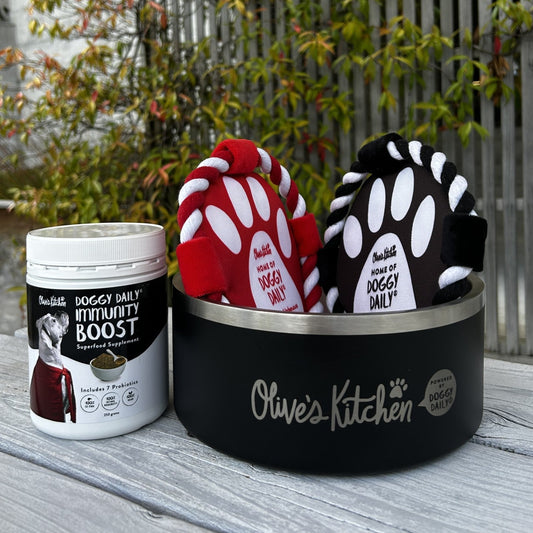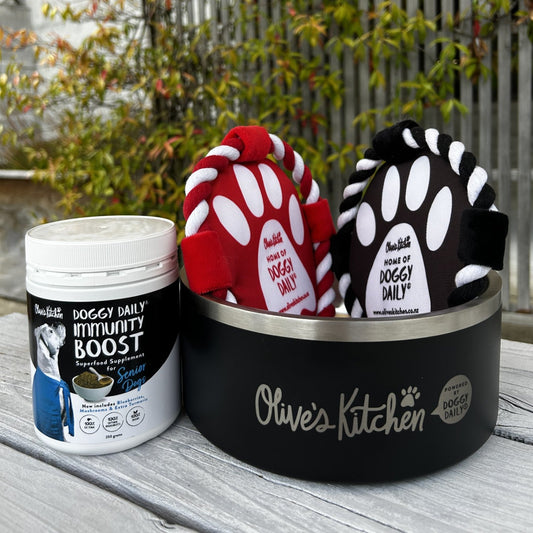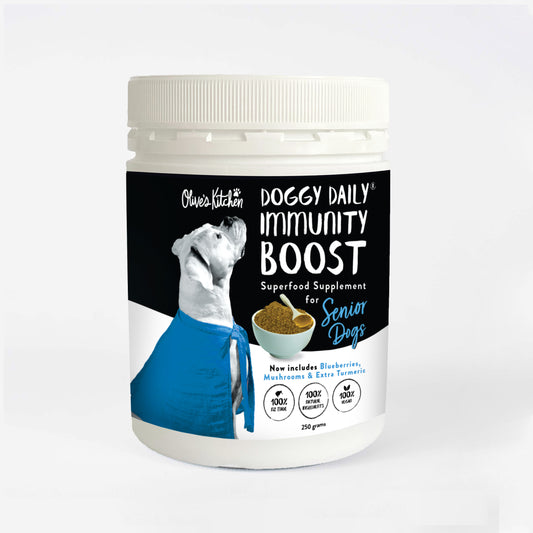We recently did a quick Q&A session with Dr Heidi Ward-McGrath to gather up some great tips and insights around oral hygiene for our four-legged family members.
Q. How often should pet parents be cleaning their dog's teeth?
A. Daily. Cleaning teeth is a daily task regardless of if you are a human or a dog.
Q. What are some simple, oral hygiene-friendly routines for pet parents?
Serving up a daily diet of fresh, abrasive food will naturally assist with the removal of plaque. Veal brisket is one example but several commercial dog diets have been specifically formulated to assist in the reduction of plaque build-up on teeth.
Basically they require your pet to chew vigorously so their teeth get a bit of a polish at the same time.
Other solutions include pet natural dental gel or spray. CET make a great veterinary dental toothpaste and it comes in edible pet flavours such as poultry. Just drop into your local vet to pick up a tube. Pet-friendly toothpaste products contain rose hydrosol which is helpful in getting to all that pesky plaque build up between teeth and gums.
Q. Can we use human toothpaste to clean our pet's teeth?
A. Human toothpaste is completely off-limits for pets because it contains foaming agents and fluoride which is a known neurotoxin.
Q. How else can we use diet to naturally assist with good oral hygiene?
A. Carrots deliver a healthy natural chew. Try coating your carrots in yoghurt or butter and then sprinkle some Doggy Daily on top as a total health treat!
Herbs such as parsley and green foods like kale can help clean the mouth plus deal to any unwelcome dog breath issues.
Q. Are some dog breeds more prone to decay?
A. In a word, yes. There are several dog breeds that are more prone to gingivitis, gum recession, dental decal and tooth loss such as Pugs, Pekingese and Shih Tzu type breeds. They often have issues with overcrowded teeth which naturally creates a trap for food to get stuck. Often the only way of addressing this build-up is with the support of your local vet.
Q. Is it necessary to visit the vet for top-up dental attention?
A. Most dogs over three years of age will need six-monthly vet dental care checks. Without it, gingivitis, dental pain and eventual tooth loss are very common outcomes. It is so important not to underestimate the impact that poor oral hygiene can have on the overall health and wellbeing of your dog. The root cause of a very unhappy animal can often track back to rotten teeth.
Final Thoughts
Good dental care begins at home with the right diet, and regular brushing. Supplement that with a six-monthly visit to your vet and you will save yourself the cost of some heavy-duty vet intervention as well as protect your beloved pet from pain.
Thanks Dr Heidi.
For Gut's Sake!
Rich in gut essential nutrients, a teaspoon of DOGGY DAILY in a wet or dry dog food enhances your pet’s gut health and so much more.
Shop for your good for the gut pet supplies online.





